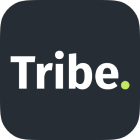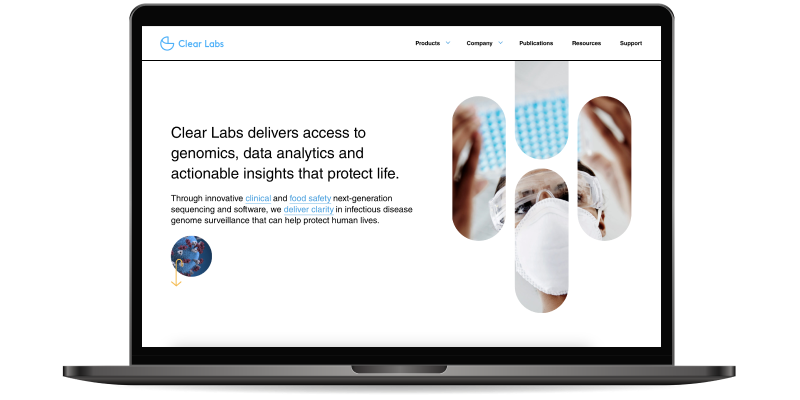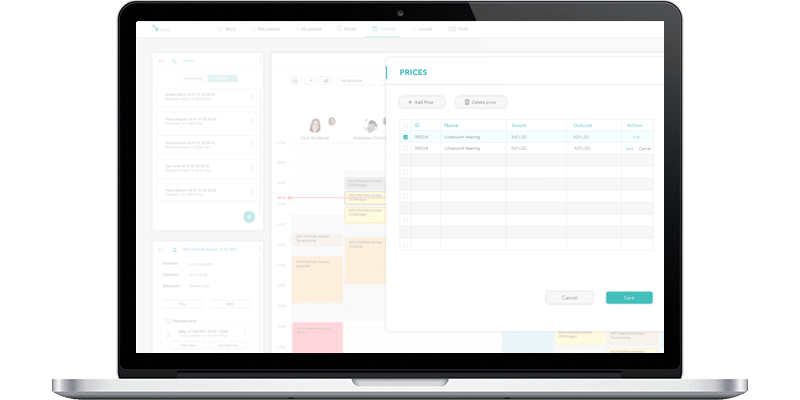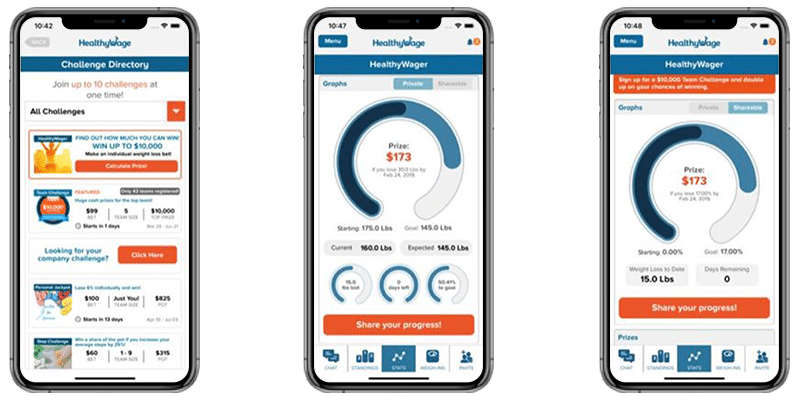The healthcare data analytics solutions we offer
Our company will tackle an end-to-end development of standalone health data solutions or a comprehensive healthcare data platform, focusing on the following products.
Big data analytics
Healthcare analytics solutions we develop will retrieve and store vast amounts of data from various sources (EHR, portals, apps, the network of medical devices, etc.). Special tools honed to process these records (both historical and real-time furnished by telemedicine solutions) will expose patterns in them and pinpoint dominating trends, thus presenting doctors with insights to be further employed for formulating individually tailored treatment plans.
Predictive analytics
Our ML-hinged solutions are extremely useful not only in disease prediction and diagnosis validation. Predictive analytics products by DICEUS will enable enhanced management of healthcare facilities, where demand forecasting, uninterrupted supply chain support, health insurance fraud prevention, etc., are the bedrock of a hospital’s efficient functioning and stable revenue stream.
Business analytics
Hospitals are intricate business mechanisms where smooth operation is no less important than the medical care services people obtain there. The business analytics solutions we provide excel in facility maintenance, claims management, personnel scheduling and optimization, performance monitoring of staff members, pharma data processing, financial issue handling, and more.
DWH solutions
Data silo is one of the scourges of contemporary medical service providers. The data warehouse products we offer eliminate barriers in data flow between an organization’s departments, provide a united venue for storing information, ensure data synchronization across various endpoints (if you need to change healthcare data entry), and limit access to it to the pool of authorized persons only.
Need another solution?
Tell us about your challenges and needs; our consultants will reply soon.
Our healthcare data analytics services
We can provide the following IT services no matter what type of healthcare data solution you select.
Can’t find the service you need?
Explore all servicesWant to discuss your project?
Contact usTypes of healthcare data analytics
To obtain a more holistic understanding of their patients, medical institutions accumulate and process slews of records that provide actionable insights into clients’ past and present conditions and serve as clues for predicting future developments. Such analytics is broadly divided into four types.
Descriptive analytics
It relies on a collection of historical information and is honed to help specialists understand what happened in the past. By utilizing simple statistical performance metrics (patients’ vitals, percentages, averages, counts, and standard deviations), it exposes the number of people hospitalized/discharged during a given period, the peak in flu season, typical symptoms patients experienced, etc. Descriptive analytics is called to identify historical trends that lay the foundations for predictive analytics.
Diagnostic analytics
While descriptive analytics is called to answer the question “what happened?”, diagnostic analytics clarifies why it happened. It digs deep into the reasons for events, trying to find an explanation for the growth of disease instances, personnel burnout, failed treatment cases, and success stories. Such information is mission-critical to ensure patients receive better care and negative developments are nipped in the bud.
Predictive analytics
This future-oriented methodology relies on machine learning algorithms and utilizes insights to generate accurate forecasts. Thanks to its predictive models, healthcare leaders can anticipate health risks for various population strata conditioned by seasonal or demographic factors, foresee how many people are likely to be released from the clinic, envisage the fill rate of hospital beds, determine potential demand for certain medicines, etc.
Prescriptive analytics
Here, all insights received at previous analysis stages are transformed into recommendations aiming to improve patient outcomes, optimize clinical trials, devise treatment plans, facilitate medical research, implement innovations, reduce treatment costs, and increase the revenues medical care providers obtain. Armed with such recommendations, doctors and administrators can make better decisions and nurture healthier communities in the long run.
Options for healthcare data analytics development
You can choose any of the following options depending on your goals, budget, and deliverables you expect to obtain.
- Software development from scratch. We perform end-to-end data analytics solution development, starting with marketing, business, and technical research and ending with delivering a full-fledged product that fits your current IT environment.
- Embedded solutions. We can create a separate data analytics module or several modules to be integrated into your existing infrastructure.
- Platform customization. We modify and tweak a third-party analytics platform (such as Microsoft Power BI, Tableau, or Oracle BI) to fit your business and operational needs.
Benefits of using data analytics in healthcare
Today, healthcare facilities are overwhelmed by the deluge of data from various sources. If medical organizations learn to analyze this data efficiently, they will enjoy the following benefits.
Challenges of implementing healthcare data analytics
Healthcare industry players poised to embrace data analytics solutions should be aware of potential bottlenecks and pitfalls they are likely to encounter in this endeavor.
- Data quality issues. Patients’ personal and medical information is highly versatile. It can be structured and unstructured, derived from different sources (medical facilities’ records, patient surveys, medical device data, etc.), and come in various formats. Very often, it lacks consistency, accuracy, completeness, relevance, integrity, and understandability. Its advanced analytics can yield positive results only if the raw input data is thoroughly curated to prepare it for further processing.
- Data visualization and reporting. If presented in textual or numerical form, data analysis results and reports don’t tell much, even to a skilled data scientist, to say nothing of medical personnel with little experience in such matters. To let employees make sense of analytics and derive meaningful insights, analysis outcomes should be presented on easy-to-understand interactive dashboards as visuals (tables, charts, graphs, maps, diagrams, etc.), which streamline pattern detection and correlation establishment.
- Data security and regulatory compliance. These two aspects are related since a number of legal norms healthcare organizations must adhere to (particularly HIPAA) specify authentication protocols, regular audits, access control, transmission safety, and other stringent measures concerning handling and storing protected health information (PHI). That is why, while developing and implementing data analytics products, medical institutions should provide two-factor user authentication, encrypt sensitive data at rest and in transit, and ensure other protective mechanisms, thus minimizing data leakage risks.
- Talent dearth. Efficient operating healthcare data analytics software requires specialists possessing a dual skill set – both in data science and the medical realm. Their qualifications will allow them to interpret the collected information correctly and translate findings into actionable insights. However, such professionals are hard to find. To close the gap, medical organizations should establish robust collaboration with academic institutions and tech companies aimed at launching interdisciplinary training programs.
- Integration with existing ecosystems. Many healthcare facilities still use legacy IT infrastructure that doesn’t play well with innovative data analytics tools because it lacks the flexibility and computational power to process vast amounts of information. In such cases, medical care providers should adopt and implement a comprehensive digital transformation strategy that will include upgrading and updating their current software environment, cloud migration, and onboarding state-of-the-art customizable solutions for handling shop floor operations.
Why choose DICEUS
Efficient information handling is the key to success in medicine. That is why you should make sure the IT healthcare data company you recruit is the right fit for its mission. What makes DICEUS your number one choice for this role?
- We have over 14 years of presence in the healthcare software development realm. Having cooperated with numerous medical service providers, we have acquired in-depth knowledge of this industry.
- 150 projects delivered. With such a large number of high-end projects we accomplished, we have hoarded vast hands-on experience and theoretical knowledge to draw upon in our future work.
- Profound data science expertise. We know how to handle data science projects from end to end and what tech stack to use for implementing them.
- The client-first approach we rely on. Whatever our customers’ wishes (and even whims) are, we are ready to oblige our clientele to the utmost to guarantee a smooth and efficient partnership.
Our achievements
Our partners







Our case studies
Testimonials
FAQ
What are healthcare data analytics services?
They embrace an entire range of services related to handling data by healthcare organizations. Typically, these include developing, modernizing, and implementing big data and predictive analytics solutions, building hospital data warehouses, migrating their digital assets to the cloud, and more.
How do healthcare data analytics benefit healthcare organizations?
Thanks to implementing high-end data analytics and predictive tools, healthcare facilities can boost medical research, improve treatment outcomes, personalize their services, optimize the shop floor routine of the organization, step up workforce management, etc.
What types of data are typically analyzed by healthcare data analytics?
These cover all information types a healthcare facility operates. Here belong various patient and clinical data (demographics, test results, medical charts), internal workflow data, financial data, pharmaceutical data, personnel data, etc. Each type requires a special tool for analysis.
What is the cost of healthcare analytics solutions?
The sum you will have to allocate for a custom healthcare analytics product is conditioned by several factors, among which are the size of the organization, the volume of data, the urgency of project delivery, the scope and complexity of the solution, the technologies used in the development, etc. Although it is never nickels and dimes, the investment is well worth it, given the weighty boons a top-notch data analytics solution ushers in.











